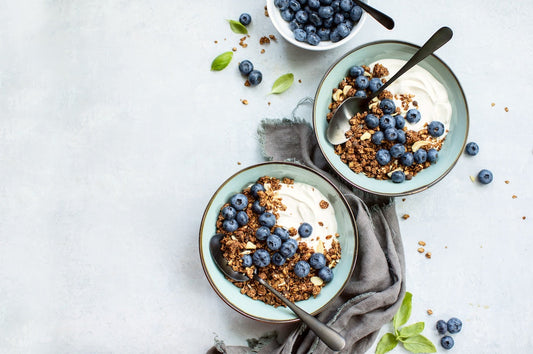What is my calorie requirement? How do I calculate my basal metabolic rate? How many calories do I need if I want to build muscle or lose fat? – Are you curious about the answers? Then you've come to the right place, because in the following, we'll explore the topic of calories and the specifics for men.
Calorie – what is it anyway?
Put simply, the energy in food is measured in calories. You may also have heard the term “fuel value”. This is another term for the energy in question. In everyday life, people often mistakenly talk about calories when they actually mean kilocalories (kcal, which is 1,000 calories). In this article, we will stick to the common term and use calorie and kilocalorie as synonyms.
On food packaging, you will also find the calorie value (kcal) in kilojoules (kJ). The latter is the official unit of measurement for energy. However, because most people are more familiar with kcal, it is still used in the food industry.
To convert kilocalories kcal to kilojoules kJ, divide by approximately 4.2. In other words, if a food has 1000 kcal, it has approximately 238 kJ.
Calculate calorie requirements
As is well known, the body needs energy in the form of food to perform everyday and important processes well. Exactly how much energy you need depends on various factors:
- Gender
- Age
- Height
- Weight
- Activity level
- Individual factors: such as illnesses that affect calorie intake
Our handy calorie calculator takes all these factors into account and provides you with a reliable result in a matter of seconds. What's more, the calorie calculator is free, of course. Try it out right now!
Find out your calorie requirement now
What do you need to bear in mind?
You have probably noticed that you also have to enter your gender in the calorie calculator. Why is that? Well, when it comes to calorie requirements, men and women differ in some ways that need to be taken into account.
Men's basal metabolic rate is higher due to their different “body composition”: this means that men naturally have a higher muscle percentage and a lower fat percentage. They are also often taller and heavier, so they have more mass and consume more calories.
If you are interested in the exact differences, it's best to read up here.
Calorie requirements for muscle building
To calculate how many calories you should eat to gain weight, you have to look at your energy balance. If you consume the same number of calories as you burn, the balance is neutral.
To lose weight, the value must be negative. So, either you eat less than your recommended calorie requirement or you do additional exercise without eating more. By contrast, the energy balance must be positive to gain weight – in other words, you should eat more than your calorie calculator shows.
It is not possible to say how many more calories you need to consume, as it depends on individual factors. In principle, however, we are talking about a calorie surplus of 300-500 kcal. However, it is advisable not to consume calories indiscriminately, but to look for healthy foods with a high protein content.
The calorie calculator provides you with your ideal calorie requirement in a practical and uncomplicated way and also takes your activity level into account. However, to build muscle, you still need to add the aforementioned calories.
What is the basal metabolic rate?
If you read up on calorie requirements and the like, you will often come across the term “basal metabolic rate”. This is the energy that your body needs at rest to carry out all the necessary processes and functions. In other words, you should definitely consume this amount of energy (in the form of food) every day, regardless of whether you want to lose or gain weight.
In contrast to this is the active metabolic rate, the part needed for additional physical activity. This part can vary from day to day, depending on how much you move. Together they make up your total metabolic rate, i.e. your recommended daily calorie requirement.
With the following formula, you can easily calculate your basal metabolic rate as a man.
- Men: BMR (kcal/day) = 1 x kg body weight x 24
For a detailed explanation and a more precise calculation, read here.
Why count calories?
There are various reasons for counting calories, which may differ from person to person. The following list is not exhaustive, but it can give you an overview of when it may be worthwhile for you to track your calories.
Count calories: Yes, please!
As mentioned earlier, you need a precise overview if you want to gain muscle or weight in general, for example. In addition, knowing your daily calorie intake can also be useful when losing weight.
It is particularly interesting to reveal the difference between your own perception and reality. For example, you may feel that you consume far too many calories, but after tracking, you realize that you could eat even more to reach your ideal calorie requirement.
The disadvantages
As with any matter, there are some arguments against constantly counting calories.
It is important that you don't stress if you happen to consume more calories than you should! But even if you still have open calories according to the information, but you are already full, you should rather listen to your intuition or your body.
If you notice that constant calorie counting puts you under pressure and you feel guilty when you eat something sweet and suddenly consume a lot of calories, it is also advisable to stop tracking.
Also, keep in mind that just because something contains few calories doesn't mean it's healthy. Nuts are usually quite high in calories. However, because they contain valuable fats and proteins, you shouldn't avoid them altogether!
That's why it's worth knowing about your calorie increase if you also want to calculate the other nutrients such as carbohydrates, proteins, fats, vitamins and minerals. Various apps can help you here.
Conclusion
In summary, it can be interesting to track calories over a period of time in order to identify certain eating habits and also to know about the increase in nutrients. However, you should not feel under pressure and you should also listen to your body!
Find out your calorie requirement now
How can Verival help you?
In addition to the practical calorie calculator, Verival also offers a variety of products to help you start the day healthy and support you on your individual journey. As already briefly mentioned, it is not only the number of calories that is important, but also the nutritional values gained.
Oats are an ideal basic ingredient for breakfast due to the nutrients they contain, such as magnesium, zinc and iron. What's more, the flakes provide long-lasting energy. How does it work exactly?
From a chemical point of view, the carbohydrates in oats consist of long chains. Once carbohydrates are absorbed, they are broken down in the body and then absorbed into the bloodstream. Depending on the length of the chains, this process occurs at different speeds. Since oat flakes are long-chained, the breakdown takes longer. Therefore, the blood sugar level rises more slowly and you stay full longer. This is of course optimal if you want to lose weight or have long-lasting energy for your workout.
However, if you are looking for a low-carb breakfast, then our mueslis with a low carbohydrate content are perfect for you! Discover our delicious low-carb mueslis in raspberry almond, almond fig or nut seed coconut flavors right now.
For those who want to ensure a higher protein intake, our protein porridge with cocoa and banana or the strawberry and sour cherry muesli are particularly suitable. Our crunchy almond cream is also perfect as a high-protein breakfast topping.
No matter what you choose, with the Verival breakfast products from the Sport range you can start the day easily and healthily!























